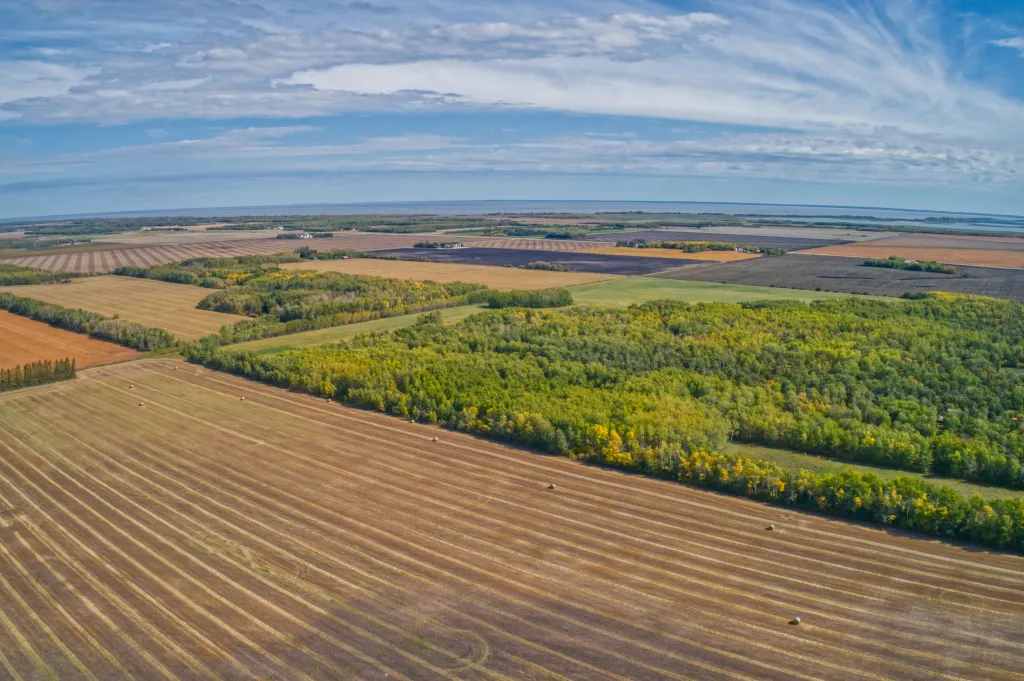Forestry is a pillar of Canada’s economy: In 2022, the industry exported $45.6 billion in products, with the United States as its largest buyer, accounting for around 1.2% of Canada’s real gross domestic product (GDP). The industry provides significant social and economic opportunities across the country, directly employing over 212,600 Canadians in every province and territory (except Nunavut), and providing employment in rural, remote and Indigenous communities, where forest-related work can often be the main source of income.
Beyond their economic and social benefits, forests play a crucial role in regulating climate across the world. Forests help to balance the Earth’s carbon cycle by sequestering carbon dioxide as they grow, and emitting it as they burn or decay. Historically, Canada’s managed forest land has acted as a carbon sink, meaning it absorbs more carbon from the atmosphere than it releases. However, over the last 35 years, multiple factors—such as an increase in land burned by wildfires; insect outbreaks and epidemics, and the subsequent responses to curtail them; and shifts in annual harvest rates—have reduced the capacity of Canada’s forest land to absorb as much carbon as it once did.
What is sustainable forest management?
To ensure the long-term environmental, social, cultural and economic health of Canada’s forests, which account for 9% of all forest land on Earth, the government has applied sustainable forest management principles to all publicly-owned forests. Laws, regulations and policies set standards for harvesting and regeneration practices; respecting Indigenous values and treaty rights; protecting allocated areas and conserving biodiversity; preventing illegal logging; and prohibiting illegal timber imports into Canada.
One of the companies shaping the industry is Weston Wood Solutions, a key player in responsible sourcing and sustainable forestry. Founded in 1985 in Ontario, Weston Wood has grown from a local supplier into a globally-recognized provider of lumber and millwork products in the building sector. Today, it employs approximately 90 people at its headquarters in Brampton, Ontario, with additional manufacturing facilities in Canada, Asia, and South America.
Meeting industry standards for sustainable forestry management
“Weston’s initiatives towards sustainable forestry began in 2008,” says Lara Lechem, Corporate Responsibility and Strategic Projects Lead at Weston Wood Solutions. “As the business has grown and evolved, we have continued to see the importance of ethical sourcing—not just from an environmental standpoint, but also for long-term business sustainability.”
Ethical sourcing is an approach to supply chain management that prioritizes suppliers and vendors that meet certain standards in areas such as fair labour practices and environmental sustainability. “We want our clients to trust that every product we offer meets the highest ethical and environmental standards,” says Lechem. “That means working only with partners who share our values and maintaining complete transparency across our supply chain.”
Weston Wood adheres to industry standards of responsible sourcing. This includes certification systems like Forest Stewardship Council (FSC), the Programme for the Endorsement of Forest Certification (PEFC), and Sustainable Forestry Initiative (SFI), as well as following laws like the Lacey Act, which prohibits the import of illegally harvested wood.
The company is also seeing an increased demand from its customers who want assurance that their materials are sourced responsibly: “While this is not a new initiative in our industry, there is certainly a renewed sense of urgency as regulations, reporting, and consumer demand related to sustainability have grown in sophistication and importance over recent years,” Lechem says.
“It’s not just about regulatory compliance—it’s about doing the right thing and creating long-term value for our stakeholders,” says Agostino Nigro, President at Weston Wood Solutions.
Reforestation partnerships that prioritize carbon sequestration
As part of their environmental sustainability goals, Weston Wood has partnered with Canada’s Forest Trust (CFT) to plant 25,000 trees over five years, as part of its Smart Forest program.
Carbon sequestration—the process of capturing and storing carbon dioxide—can help to reduce greenhouse gas emissions and mitigate the effects of global warming. By investing in its Smart Forest initiative, Weston Wood is not only offsetting its carbon impact, but it is also actively restoring the forests it relies on for business. Weston Wood will plant 5,000 saplings annually, including Black Spruce, Red Pine, and Jack Pine, in Porter Cove, New Brunswick, a region known for its biodiversity.
When Weston Wood sought a partner for its reforestation efforts, CFT stood out for its shared values. CFT works to emphasize reforestation’s broader benefits, including supporting biodiversity and long-term impact.
“We chose a partnership that focuses on active carbon sequestration, contributing to a cyclical, generational impact on the environment,” says Lechem. “As the forest matures, its capacity to absorb carbon grows exponentially, creating a legacy of environmental stewardship.”
Over the next 20 years, an estimated 310,000 kg (310 metric tonnes) of carbon will be sequestered through Weston Wood’s planting commitment, which began in January 2024.
Reducing the environmental impact of business operations
Weston Wood’s environmental commitment extends beyond the forest. As part of its broader environmental strategy, the company has made significant infrastructure investments aimed at reducing the environmental impact of its operations:
Vehicle electrification
Its entire forklift fleet at the Brampton headquarters has been switched from gas to electric power with more electrification planned for other facilities.
“This switch has reduced our reliance on fossil fuels, lowered emissions, and cut long-term operational costs,” says Lechem.
Building retrofits
In addition to electrifying some of its equipment at its headquarters, the company recently completed a major LED lighting retrofit, replacing outdated systems with energy efficient alternatives. The change, Lechem says, will drive notable energy savings while reducing the company’s environmental impact.
Recycling programs
Weston Wood has also expanded its recycling programs at its Brampton and Sault Ste. Marie locations, focusing on three key areas, including biomass energy (repurposing wood chips into biofuels to generate sustainable energy), mulch and compost (converting excess wood into landscaping materials), and manufactured products (recycling wood into particleboard and plywood).
Environmental sustainability as a business strategy
“As we’ve formalized our sustainability processes, we’ve realized that sustainability has always been part of our ethos,” says Lechem. “We work with natural materials, so it only makes sense that we take responsibility for protecting those resources. Now, we’re just making sure we do it in a way that’s measurable, transparent, and built to last.”
“Environmental responsibility can be a strategic business advantage and not just a compliance necessity,” says Lechem. “Businesses that integrate sustainability into their strategy will have stronger customer trust, regulatory compliance, and long-term profitability.”
By prioritizing strategic partnerships and forward-thinking environmental initiatives, Weston Wood Solutions is demonstrating that environmentally-sustainable business practices are more than just an obligation—they can be a driver of resilience and growth in an evolving industry.
This article is intended as general information only and is not to be relied upon as constituting legal, financial or other professional advice. A professional advisor should be consulted regarding your specific situation. Information presented is believed to be factual and up-to-date but we do not guarantee its accuracy and it should not be regarded as a complete analysis of the subjects discussed. All expressions of opinion reflect the judgment of the authors as of the date of publication and are subject to change. No endorsement of any third parties or their advice, opinions, information, products or services is expressly given or implied by Royal Bank of Canada or any of its affiliates.






